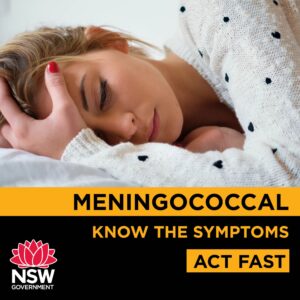
Spring has spring and so has meningococcal season.
It’s a rare disease most commonly affecting children under 5-years-old and those between 12 and 24-years-old and then older people.
This year in the Hunter New England Health District there have been three cases of the rare, and in some cases fatal disease.
Health Protection Program Manager, Peter Massey from Hunter New England Health said it can happen to anyone, but particularly in the younger age groups.
“Meningococcal can also happen across any age group but generally you would see it in young children, teenagers and young adults and then again in older people. In young children and babies in particular is where the disease is most common and most severe,” he said.
“The thing with meningococcal it continues to get worse over time pretty quickly.”
“Thankfully 90 per cent of people who get this disease make a full recovery, the antibiotics we have today are fantastic and make a big difference but you need to present to your GP or hospital if you’re sick.”
While most people recover there’s a 10 per cent chance you could die even with rapid treatment and a 40 per cent chance of ending up with significant long term effects, including limb or digit amputation or skin scarring.
“Thankfully it’s an uncommon disease. We only get about 10 to 15 cases each year in the Hunter New England. We see it more in households where people are smoking and where there are a lot of people in the house,” said Peter Massey.
Vaccines are also available for meningococcal. The ACWY vaccine is on the vaccination schedule at 12 months of age. The vaccine for the B strain should be discussed with your doctor or immunisation service.
“We provide a vaccine at 12 months of age and that covers the types A, C, W and Y so make sure the children in your family are up to date with their immunisations even in COVID times make sure you get your children immunised on time,” said Peter Massey.
“So far this year we’ve had three cases across Hunter New England, each of them have been quite unwell and in hospital for a period of time but have recovered. We’re hoping with keeping the distance like we are with COVID and wearing masks that will reduce the spread of this bug but we can never be sure it is a nasty bug as well.”
Symptoms can vary but may include:
* sudden fever
* nausea
* vomiting
* abdominal pain
* headache
* neck stiffness
* joint pain
* dislike of bright lights
* irritability
* a red-purple rash that doesn’t disappear
when pressure is applied (a rash does not
always appear or it may occur late in the
disease)
In young children, symptoms may also include:
* irritability
* difficulty waking up
* high-pitched crying
* rapid or laboured breathing
* refusal to eat
Sometimes the classic symptoms may follow less specific symptoms, including leg pain, cold hands and abnormal skin colour.
If you think you or someone you know could have meningococcal disease, seek urgent medical advice.
More info: https://www.health.nsw.gov.au/Infectious/meningococcal/Pages/default.aspx

